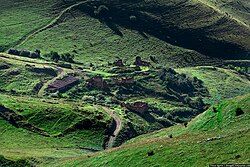Metskhal
Metskhal
Мецхал | |
|---|---|
| Other transcription(s) | |
| • Ingush | Мецхал |
 Ruins of Metskhal | |
| Coordinates: 42°49′36″N 44°44′18″E / 42.82667°N 44.73833°E | |
| Country | Russia |
| Federal subject | Ingushetia |
| Population | |
| • Total | 0 |
| • Estimate (2021)[2] | 0 |
| • Subordinated to | Dzheyrakhsky District |
| Time zone | UTC+3 (MSK |
| Postal code(s)[4] | 386430 |
| OKTMO ID | 26620430116 |
Metskhal (Ingush: Мецхал, romanized: Metskhal)[5] is an abandoned aul in the Dzheyrakhsky District of Ingushetia. It is part of the rural settlement of Lyazhgi (administrative center rural settlement).
Etymology
[edit]The name was most likely based on the Ingush word "metskhalg", which means "swift", which was revered by the Ingush. Perhaps Metskhal has connection with the name of the ancient capital of Georgia Mtskheta.[6]
Geography
[edit]Metskhal is located northeast of the village of Falkhan, on the spur of Mountain Mätloam.
History
[edit]
On January 8, 1811, foremen of 13 Kistin (Fyappin) villages including Metskhal made act of oath for the Russian Empire.[7] However it is worth saying that even after the oath of individual Ingush society or clans, the former Russian-Ingush relations remained the same. In fact, both sides took these type of oaths as a conclusion union treaties.[8]
Per List of populated areas of the Military-Ossetian Okrug in 1859, Metskhal had 13 households and it was part of the Military-Ossetian Okrug as part of the Kistin society.[9]
In Metskhal there were once separate, but closely interconnected powerful tower castle complexes of the Dzhabagievs, Tochievs, Kusievs, and Kotievs. This tower complex was the administrative, cultural and economic center of the late-medieval Fyappin or Metskhalin society (in the 19th century).[10]
Metalworking has been widely developed among the Ingush since ancient times. Local artisans skillfully combined various metal processing operations: graining, blackening, gilding, inlay with multi-colored inserts. The most famous centers of jewelry among the Ingush were Metskhal and others.
A prominent place in the history of religious beliefs is occupied by Christianity, which penetrates to the Ingush first from Georgia (beginning of 12th to 13th centuries and 17th century), later Russia (18-19 centuries). Three Christian churches were located in the Assinovskaya Hollow: Tkhaba-Yerdy, Alby-Yerdy and Thargam-Erdy. Early Christian stone-box burials of this period were found near the village of Metskhal and others.[11]
The Metskhal tower complex is a large settlement consisting of two powerful castle complexes. There were two battle towers. One of the battle towers with a flat roof was clearly visible. Defensive walls and residential towers were preserved until 1944, when after the Deportation of Chechens and Ingush, the entire complex was mined and blown up.[12]
According to the stories of the abreks:
The Metskhal Tower was one of the largest. All attempts to destroy it ended in failure, and then the Soviet troops decided to fill the entire first floor with explosives. When the explosion was heard, nothing happened to it for several seconds, but a strong crack was heard. The tower was so strong that even with such a filling it was not torn to pieces, but it took off into the sky like a rocket, flew several meters high while being intact and fell on the ground and crashed!
References
[edit]- ^ Russian Federal State Statistics Service (2011). Всероссийская перепись населения 2010 года. Том 1 [2010 All-Russian Population Census, vol. 1]. Всероссийская перепись населения 2010 года [2010 All-Russia Population Census] (in Russian). Federal State Statistics Service.
- ^ Итоги Всероссийской переписи населения 2020 года. Федеральная служба государственной статистики.
- ^ "Об исчислении времени". Официальный интернет-портал правовой информации (in Russian). 3 June 2011. Retrieved 19 January 2019.
- ^ Почта России. Информационно-вычислительный центр ОАСУ РПО. (Russian Post). Поиск объектов почтовой связи (Postal Objects Search) (in Russian)
- ^ Мальсагов 1963, p. 146.
- ^ Голан, А. ""Миф и символ" (избранное)" ["Myth and Symbol" (favorited)]. www.fedy-diary.ru. Archived from the original on 2016-08-16. Retrieved 2016-07-03.
- ^ Доклад о границах и территории Ингушетии 2021, p. 82 (referring to РГВИА Ф. ВУА Д. 6184, Ч. 72, Л. 85; АКАК, Т. IV, Д. 1389, p. 904).
- ^ Долгиева et al. 2013, p. 236.
- ^ Сборник документов и материалов 2014, pp. 484–485 (referring to Список населённых местностей Военно-осетинского округа 1859 г." (РГВИА. Ф. 13454. ОП. 15. Д. 202. Л. 101—111)).
- ^ "Мецхал, Бейни и Фалхан" [Metskhal, Beyni and Falkhan]. www.ingushforum.ru. Archived from the original on 2016-08-08. Retrieved 2016-06-27.
- ^ "Материальная и духовная культура Ингушей" [Material and spiritual culture of the Ingush]. www.ingushetia.ru. Archived from the original on 2016-07-07. Retrieved 2016-06-27.
- ^ Евлоев, Казбек. "Башни вне закона. Пришло время собирать камни!" [Towers are illegal. It's time to collect the stones!]. www.kavpoli.com. Archived from the original on 2016-08-15. Retrieved 2016-06-27.
Bibliography
[edit]- Мальсагов, З. К. (1963). Оздоева, Ф. (ed.). Грамматика ингушского языка [Grammar of the Ingush language] (in Ingush and Russian). Vol. 5 (2nd ed.). Грозный: Чечено-Ингушское Книжное Издательство. pp. 1–164.
- Общенациональная Комиссия по рассмотрению вопросов, связанных с определением территории и границ Ингушетии (2021). Всемирный конгресс ингушского народа (ed.). Доклад о границах и территории Ингушетии (общие положения) [Report on the borders and territory of Ingushetia (general provisions)] (archival documents, maps, illustrations) (in Russian). Назрань. pp. 1–175.
{{cite book}}: CS1 maint: location missing publisher (link) - Картоев, М. М. (2014). Ингушетия в политике Российской империи на Кавказе. XIX век. Сборник документов и материалов [Ingushetia in the policy of the Russian Empire in the Caucasus. 19th century. Collection of documents and materials]. История Ингушетии: открытый архив (in Russian) (1st ed.). Ростов-на-Дону: Южный издательский дом. pp. 1–604. ISBN 978-5-98864-060-8.
- Долгиева, М. Б.; Картоев, М. М.; Кодзоев, Н. Д.; Матиев, Т. Х. (2013). Кодзоев, Н. Д. (ed.). История Ингушетии [History of Ingushetia] (4th ed.). Ростов-на-Дону: Южный издательский дом. pp. 1–600. ISBN 978-5-98864-056-1.



